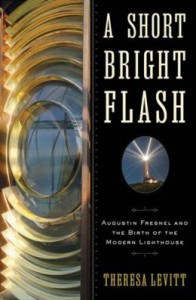OXFORD, Miss. – A new book by Theresa Levitt, an associate professor of history at the University of Mississippi, is attracting attention from scholars, book reviewers and readers across the country.
“A Short Bright Flash: Augustin Fresnel and the Birth of the Modern Lighthouse” (W.W. Norton & Co., 2013) tells the story of how Fresnel, a French engineer and physicist who lived from 1788 to 1827, developed a groundbreaking theory of light that wound up saving untold lives by making lighthouse bulbs shine many times brighter. Levitt wrote about the man and his lens in a scientific and historical narrative that also has plenty of personality.
Levitt is grateful for the recognition the book has received.
“It’s fabulous,” Levitt said. “Many times when academics write books, they are read only by the other historians in our field. … It has been enormously gratifying to have all sorts of people from across the spectrum that are reading it. I have been getting a lot of letters and emails from people who have read it and wrote in to say they enjoyed it. It’s gratifying to know people are actually reading your work.”
Before Fresnel’s work to develop better lenses, lighthouses used mirrors to send the light out, and it didn’t travel nearly far enough to warn ships, only reaching about 5 to 8 miles offshore. The light from Fresnel’s lenses was visible from much farther away, which greatly improved safety for vessels traveling along coastlines.
“They didn’t really function very well to warn you away from shoals or rocks, which could often be 10 miles off shore,” Levitt said. “Once you get the invention of these vastly brighter lenses and you can see them 20 to 30 miles away, it really made, in some sense, lighthouses possible. Previously, they had really just been functioning as harbor lights.”
Fresnel was a scientific outsider who had to battle the establishment and his own failing health, but lighthouses equipped with the technology he invented soon lit up the entire French Coast. The British were forced to set aside national pride and scrap their plans to develop a lens better than Fresnel’s after realizing his was superior. Over the next few decades, the United States and many other countries eventually adopted the technology, too. Levitt tells the story of how Fresnel’s lifesaving technology spread around the world.
The book is getting positive reviews in several large U.S. newspapers. One came from Henry Petroski, a professor of civil engineering at Duke University, who wrote about it in a Sept. 23 Wall Street Journal piece.
“Ms. Levitt recounts all this in fine prose, combining matters of biography, science, engineering, technology, art, history, economics and politics seemingly effortlessly and definitely seamlessly,” Petroski wrote. “‘A Short Bright Flash’ is an excellent book and a joy to read.”
